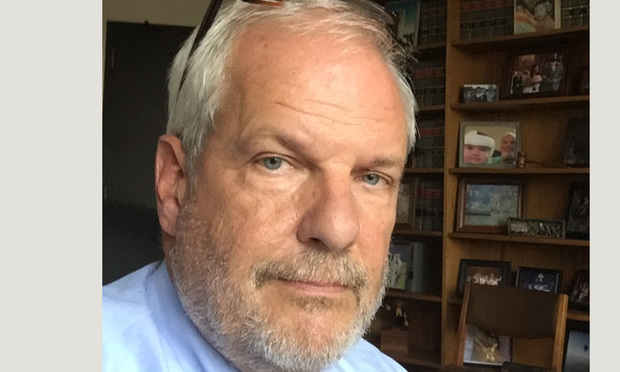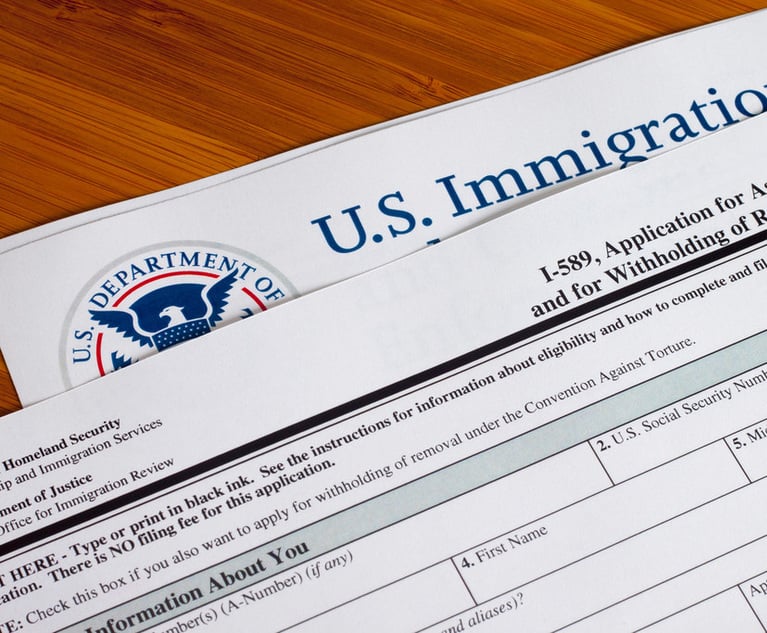COVID Could Prompt Litigants to Choose Bench Trials Over Juries, Thanks to 6-Month Backlog of Civil Cases
"We will be able to right the ship within six months," said James Abrams, the chief administrative judge for civil matters in the Superior Court system.
June 30, 2020 at 01:33 PM
4 minute read
 James Abrams, the chief administrative judge for civil matters, Superior Court system. Courtesy photo
James Abrams, the chief administrative judge for civil matters, Superior Court system. Courtesy photo
The COVID-19 pandemic has caused a backlog of Connecticut civil jury trials of at least six months.
And that delay could prompt attorneys to opt for bench trials, according to James Abrams, the chief administrative judge for civil matters in the Superior Court system.
Already the docket has grown.
Pending civil jury trials in the state as of June 25 stood at 11,175, a jump of nearly 1,000 cases from one year earlier.
The courts also saw a rise in litigants opting to plead their case to judges, rather than juries.
Pending civil bench trials as of June 25 reached 3,349, compared with 2,983 during the same period last year.
"The numbers of pending trials would most probably have been lower if it was not for COVID," Abrams said. "If we were doing jury trials since March, the numbers would have been more in line with what they were in 2019."
But Abrams is optimistic about getting back on track, especially if jury trials begin in November.
"We will be able to right the ship within six months," he said. "There would be a six-month backlog. That is a situation we will be able to manage."
A vocal proponent of bench trials, Abrams hopes the pandemic leads to more cases before judges, rather than juries. The exceptions, Abrams said, include cases such as medical malpractices lawsuits, which are better handled in a jury setting.
"Because of COVID, I am hopeful more attorneys will want to go the bench trial route," he said. "I'm hopeful COVID has taught people that it's quick and easier. … A jury trial takes longer to do. A bench trial in a relatively simple personal injury case could take a matter of hours, whereas it could take many days with a jury trial because you are picking a jury for a few days, then evidence usually takes a day and closing arguments take time and there is the charge to the jury."
Jury selection and a trial are, generally speaking, a minimum of four days, Abrams said.
Abrams, who said remote pretrials in civil cases in the state will begin soon, added, "Once we demonstrate that we can do remote hearings and trials, my hope is that we will get some cases currently scheduled for jury trial to be moved to court side."
While many attorneys say there are upsides to bench trials, they also note there are many downsides.
Jamie Sullivan, a longtime partner at Howard Kohn Sprague & FitzGerald, said he favors bench trials in the short term because "it will move business and will allow cases to be adjudicated."
But Sullivan said, "Few people realize how important this system of having a jury is to the American democracy. It not only allows the most powerless to render judgment on the most powerful, but it allows citizens from different backgrounds to engage in principled debate, and to lose that would be incredibly damaging for democracy."
Pullman & Comley member Monte Frank, also co-chairman of the Connecticut Bar Association's COVID-19 Task Force, said, "Being in the courtroom is what we train for and what skilled lawyers value."
Frank notes bench trials do have positives, saying, "They will no question lower costs in some instances and will reduce the access-to-justice gap."
Related stories:
Backlogs More Than Double Pre-Coronavirus Level in New Jersey Trial Courts
This content has been archived. It is available through our partners, LexisNexis® and Bloomberg Law.
To view this content, please continue to their sites.
Not a Lexis Subscriber?
Subscribe Now
Not a Bloomberg Law Subscriber?
Subscribe Now
NOT FOR REPRINT
© 2025 ALM Global, LLC, All Rights Reserved. Request academic re-use from www.copyright.com. All other uses, submit a request to [email protected]. For more information visit Asset & Logo Licensing.
You Might Like
View All

Trump Administration Faces Legal Challenge Over EO Impacting Federal Workers
3 minute read
Settlement Allows Spouses of U.S. Citizens to Reopen Removal Proceedings
4 minute read
Law Firms Mentioned
Trending Stories
- 1Uber Files RICO Suit Against Plaintiff-Side Firms Alleging Fraudulent Injury Claims
- 2The Law Firm Disrupted: Scrutinizing the Elephant More Than the Mouse
- 3Inherent Diminished Value Damages Unavailable to 3rd-Party Claimants, Court Says
- 4Pa. Defense Firm Sued by Client Over Ex-Eagles Player's $43.5M Med Mal Win
- 5Losses Mount at Morris Manning, but Departing Ex-Chair Stays Bullish About His Old Firm's Future
Who Got The Work
J. Brugh Lower of Gibbons has entered an appearance for industrial equipment supplier Devco Corporation in a pending trademark infringement lawsuit. The suit, accusing the defendant of selling knock-off Graco products, was filed Dec. 18 in New Jersey District Court by Rivkin Radler on behalf of Graco Inc. and Graco Minnesota. The case, assigned to U.S. District Judge Zahid N. Quraishi, is 3:24-cv-11294, Graco Inc. et al v. Devco Corporation.
Who Got The Work
Rebecca Maller-Stein and Kent A. Yalowitz of Arnold & Porter Kaye Scholer have entered their appearances for Hanaco Venture Capital and its executives, Lior Prosor and David Frankel, in a pending securities lawsuit. The action, filed on Dec. 24 in New York Southern District Court by Zell, Aron & Co. on behalf of Goldeneye Advisors, accuses the defendants of negligently and fraudulently managing the plaintiff's $1 million investment. The case, assigned to U.S. District Judge Vernon S. Broderick, is 1:24-cv-09918, Goldeneye Advisors, LLC v. Hanaco Venture Capital, Ltd. et al.
Who Got The Work
Attorneys from A&O Shearman has stepped in as defense counsel for Toronto-Dominion Bank and other defendants in a pending securities class action. The suit, filed Dec. 11 in New York Southern District Court by Bleichmar Fonti & Auld, accuses the defendants of concealing the bank's 'pervasive' deficiencies in regards to its compliance with the Bank Secrecy Act and the quality of its anti-money laundering controls. The case, assigned to U.S. District Judge Arun Subramanian, is 1:24-cv-09445, Gonzalez v. The Toronto-Dominion Bank et al.
Who Got The Work
Crown Castle International, a Pennsylvania company providing shared communications infrastructure, has turned to Luke D. Wolf of Gordon Rees Scully Mansukhani to fend off a pending breach-of-contract lawsuit. The court action, filed Nov. 25 in Michigan Eastern District Court by Hooper Hathaway PC on behalf of The Town Residences LLC, accuses Crown Castle of failing to transfer approximately $30,000 in utility payments from T-Mobile in breach of a roof-top lease and assignment agreement. The case, assigned to U.S. District Judge Susan K. Declercq, is 2:24-cv-13131, The Town Residences LLC v. T-Mobile US, Inc. et al.
Who Got The Work
Wilfred P. Coronato and Daniel M. Schwartz of McCarter & English have stepped in as defense counsel to Electrolux Home Products Inc. in a pending product liability lawsuit. The court action, filed Nov. 26 in New York Eastern District Court by Poulos Lopiccolo PC and Nagel Rice LLP on behalf of David Stern, alleges that the defendant's refrigerators’ drawers and shelving repeatedly break and fall apart within months after purchase. The case, assigned to U.S. District Judge Joan M. Azrack, is 2:24-cv-08204, Stern v. Electrolux Home Products, Inc.
Featured Firms
Law Offices of Gary Martin Hays & Associates, P.C.
(470) 294-1674
Law Offices of Mark E. Salomone
(857) 444-6468
Smith & Hassler
(713) 739-1250










